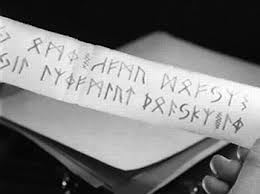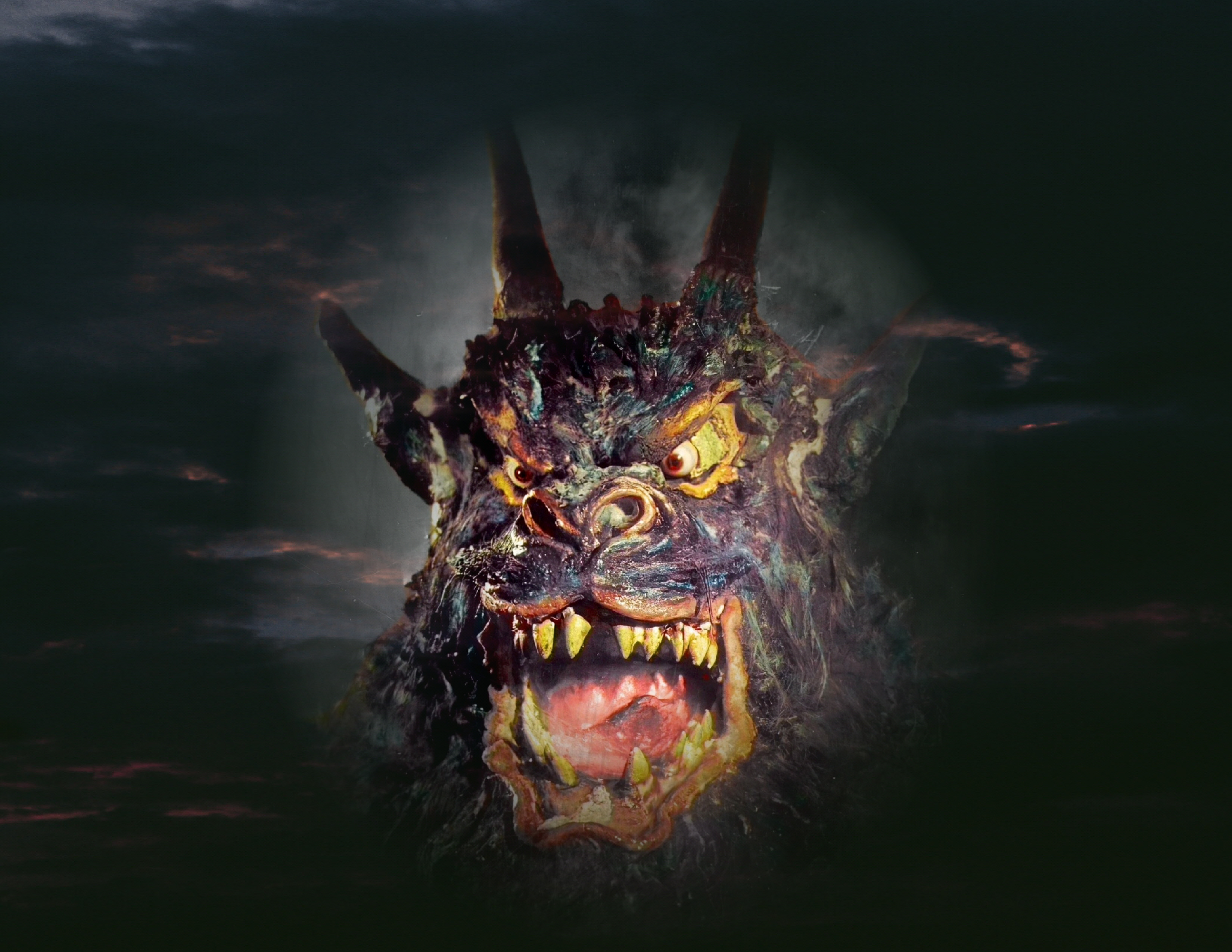Derivative Images
Who doesn't love a good horror movie? I tend to more sophisticated and intelligent movie material and less gore, but, to each his own.
So let's do a movie review -
Curse of the Demon aka Night of the Demon is a true horror classic.
The basics:
How does he do it? By passing Holden a Runic Script that will conjure up a fire demon to kill Holden at the "designated time."

The cursed Runic Script. - http://www.dvdjournal.com
Horror films that seriously confront the no-man's land between rational reality and supernatural belief have a tough time of it. Everyone who believes in God knows that the tug o' war between rationality and faith in our culture has become so clogged with insane belief systems it's considered impolite to dismiss people who believe in flying saucers or the powers of crystals or little glass pyramids. One of Dana Andrews' key lines in Curse of the Demon, defending his dogged skepticism against those urging him to have an open mind, is his retort, "If the world is a dark place ruled by Devils and Demons, we all might as well give up right now." Curse of the Demon balances itself between skepticism and belief with polite English manners, letting us have our fun as it lays its trap. We watch Andrews roll his eyes and scoff at the feeble séance hucksters and the dire warnings of a foolish-looking necromancer. Meanwhile, a whole dark world of horror sneaks up on him. The film's intelligent is such that we're not offended by its advocacy of dark forces or even its literal, in-your-face demon.
Holden may think he has the truth by the tail but it takes Kindergarten teacher Joanna Harrington (Peggy Cummins of Gun Crazy fame) to show him that being a skeptic doesn't mean ignoring facts in front of one's face. Always ready for a drink (a detail added to tailor the part to Andrews?), Holden spends the first couple of reels as interested in pursuing Miss Harrington, as he is the devil-worshippers. The details and coincidences pile up with alarming speed -- the disappearing ink untraceable by the lab, the visual distortions that might be induced by hypnosis, the pages torn from his date book and the parchment of runic symbols. Holden believes them to be props in a conspiracy to draw him into a vortex of doubt and fear. Is he being set up the way a Voodoo master cons his victim, by being told he will die, with fabricated clues to make it all appear real? Holden even gets a bar of sinister music stuck in his head. It's the title theme -- is this a wicked joke on movie soundtracks?

Dr. Julian Karswell with Grimalkin the cat. - http://wikifandom.com
This brings us to the wonderful character of Julian Karswell, the kiddie-clown turned multi-millionaire cult leader. The man who launched Alfred Hitchcock as a maker of sophisticated thrillers here creates one of the most interesting villains ever written, one surely as good as any of Hitchcock's. In the short American cut Karswell is a shrewd games-player who shows Holden too many of his cards and finally outsmarts himself. The longer UK cut retains the full depth of his character.
Karswell has tapped into the secrets of demonology to gain riches and power, yet he tragically recognizes that he is as vulnerable to the forces of Hell as are the cowering minions he controls through fear. Karswell's coven means business. It's an entirely different conception from the aesthetic salon coffee klatch of The Seventh Victim, where nothing really supernatural happens and the only menace comes from a secret society committing new crimes to hide old ones.
Karswell keeps his vast following living in fear, and supporting his extravagant lifestyle under the idea that Evil is Good, and Good Evil. At first the Hobart Farm seems to harbor religious Christian fundamentalists who have turned their backs on their son. Then we find out that they're Karswell followers, living blighted lives on cursed acreage and bled dry by their cultist "leader." Karswell's mum (Athene Seyler) is an inversion of the usual insane Hitchcock mother. She lovingly resists her son's philosophy and actively tries to help the heroes. That's in the Night version, of course. In the shorter American cut she only makes silly attempts to interest Joanna in her available son and arranges for a séance. Concerned by his "negativity", Mother confronts Julian on the stairs. He has no friends, no wife, no family. He may be a mass extortionist but he's still her baby. Karswell explains that by exploiting his occult knowledge, he's immersed himself forever in Evil. "You get nothing for nothing"
Karswell eventually earns Holden's respect, especially after the fearful testimony of Rand Hobart. It's taken an extreme demonstration to do it, but Holden budges from his smug position. He may not buy all of the demonology hocus-pocus but it's plain enough that Karswell or his "demon" is going to somehow rub him out. Seeking to sneak the parchment back into Karswell's possession, Holden becomes a worthy hero because he's found the maturity to question his own preconceptions. Armed with his rational, cool head, he's a force that makes Karswell -- without his demon, of course -- a relative weakling. Curse of the Demon ends in a classic ghost story twist, with just desserts dished out and balance recovered. The good characters are less sure of their world than when they started, but they're still able to cope. Evil has been defeated not by love or faith, but by intellect.
Wisdom of the East

Dr. Kumar (center) - http://filmfreedonia.com
Dr. Kumar, played by an Anglo actor, Peter Elliot immediately evokes all those Indian and other Third World characters in Hammer films whose indigenous cultures invariably hold all manner of black magic and insidious horror. When Hammer films are repetitious it's because they take eighty minutes or so to convince the imagination-challenged English heroes to even consider the premise of the film as being real. In Curse of the Demon, Holden's smart-tongued dismissal of outside viewpoints seems much more pigheaded now than it did in 1957, when heroes confidently defended conformist values without being challenged. Kumar is a scientist but also probably a Hindu or a Sikh. He has no difficulty reconciling his faith with his scientific detachment. Holden is far too tactful to call Kumar a crazy third-world guru but that's probably what he's thinking. He instead politely ignores him. Good old Kumar then saves Holden's hide with some timely information.
Spoiler
In the end, Holden successfully returns the runes to Karswell under the guise of handing him his coat. The sorcerer immediately realises what has happened and is forced to chase after the parchment, which seems to have a life of its own, until it seems to spontaneously catch fire and burn by the railways tracks.

Karswell meets his "just end." - filmfreedonia.com
Karswell finds himself caught between the demon and an oncoming train, a circumstance that allows Holden and Joanna a chance to withdraw from the scene with at least a sliver of ambiguity still in their minds – “Perhaps it’s best not to know,” Holden says, echoing the “they tampered in God’s domain” homily at the end of many a ’50s scifi film. But, of course, the film privileges the audience with Karswell’s viewpoint of a colossal monstrosity that picks him up and claws him with vicious, punitive disdain. The climax delivers a truly nightmarish image; the demon, viewed towering behind a speeding train, wreathed in smoke, Karswell’s body jangling upon its claws before being tossed lifelessly down to lie smoking and bedraggled upon the rails. Again, this moment is so spectacularly achieved I just can’t find it in me to condemn it. Today, most genre filmmakers would much rather have their monster even if they have no conviction about the supernatural or deep feeling about its metaphorical potency. - https://filmfreedonia.com/2017/10/27/night-of-the-demon-aka-curse-of-the-demon-1957/

http://filmfreedonia.com
So give it a watch - you'll be terribly amused and a little surprised at the quality of acting and storyline.




